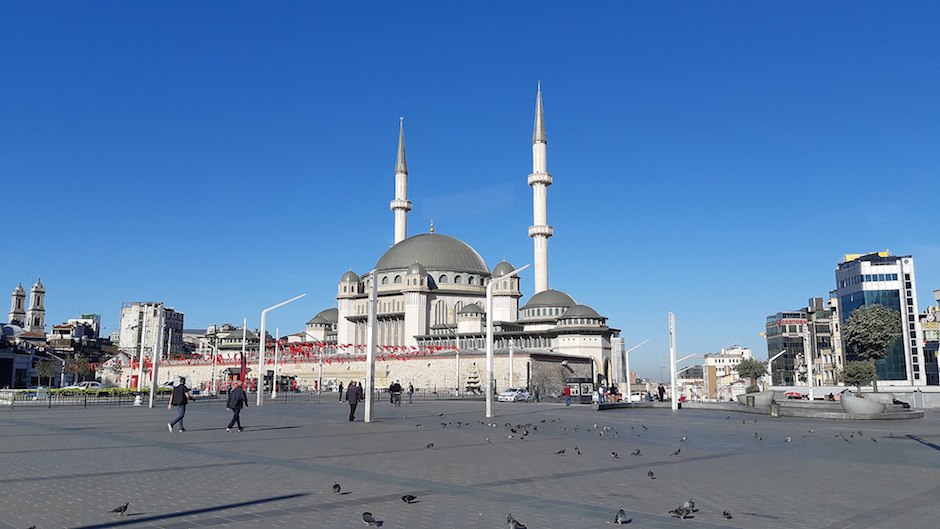The new Islamic worship centre in the centric Taksim Square “now occupies a prominent place among the symbols of Istanbul”, says Turkish President Erdogan.
 The new mosque located in Taksim Square. / Jelican 9, Wikimedia Commons.
The new mosque located in Taksim Square. / Jelican 9, Wikimedia Commons.
After turning the Hagia Sophia Basilica and the Byzantine church of Holy Saviour of Chora into mosques in July and August 2020, the Turkish government continues its unofficially declared process of confessionalising the state, and has now inaugurated a new mosque in Istanbul's central Taksim Square.
The building can accommodate 2,500 people inside and 4,000 throughout the 16,500 square metre site. It also has a three-floor car park with a capacity for 165 vehicles.
“Taksim Mosque now occupies a prominent place among the symbols of Istanbul”, said Turkish President Recep Tayyip Erdogan at the inauguration.
Since he was elected mayor of Istanbul in 1994 and committed to the construction of the mosque, for the leader of the moderate Islamist AKP party and guarantor of what he has called “the pious generation”, the mosque in Taksim Square has been a cornerstone in the development of his desire for an increasingly intense relationship between politics and (Islamic) religion in Turkey.
This has also helped, in part, to keep the focus of radical Islamism in the Middle East away from Turkey.
Beyond being located in Taksim, described by some as “the traditional secular and liberal heart of Turkey's largest city”, the new mosque is also near a monument to the Republic and the Atatürk cultural centre, which was built to honor the founder of the secular modern republic, Mustafa Kemal Atatürk.
Furthermore, the inauguration of the mosque coincides with the eighth anniversary of the Gezi Park demonstrations, which began in May 2013 to protest against government plans to build a shopping mall, cultural centre and mosque on the site, and ended with eleven dead, 11,000 injured and 3,000 arrested.
“In addition to being a place of worship, Taksim Mosque will be one of the most important cultural and artistic centres of Istanbul with its digital library, reading lounge and exhibition areas”, pointed out Erdogan.
He stressed that “this third important spiritual legacy we have given Istanbul recently, after the completion of the Great Camlica Mosque, and the reopening of Hagia Sophia, will light up our city like a lamp for centuries”.
Mosque in Istanbul's Taksim Square will open its doors to worshippers today, with President Erdogan inaugurating pic.twitter.com/MDKef98ZUm
— ANADOLU AGENCY (@anadoluagency) May 28, 2021
Although Erdogan has always had a good relationship with moderate Turkish Islamism, in recent years he has intensified his efforts to bring his government closer to the country's main religion. Especially since the coup attempt in 2016 and the confrontation with the Hizmet movement and its leader Fetullah Gülen.
News website Al-Monitor reported that, during the pandemic, Erdogan's government has adopted controversial measures that contradict the secular line of the state, such as banning the sale of alcoholic beverages during 17 days of lockdown. Moreover, in recent years, religious institutions and education have also expanded in the country.
One example is the controversial Directorate of Religious Affairs, which under Erdogan's government has gained unprecedented influence and to which the republic's President has given more money than to other important institutions in the country.
Also according to Al-Monitor, by 2020 this entity had reached 128,000 employees, and now manages a total of 90,000 mosques and 20,000 Quranic courses across the country.
Erdogan's government has allocated a budget of 13 billion Turkish liras (more than 1.2 billion Euros) to the Directorate, making it the thirteenth most funded public institution of the 40 state-funded institutions.
Its president, Ali Erbas, has stated that they “have to make the most of the opportunities presented to us to raise a pious generation”.

Las opiniones vertidas por nuestros colaboradores se realizan a nivel personal, pudiendo coincidir o no con la postura de la dirección de Protestante Digital.
Si quieres comentar o